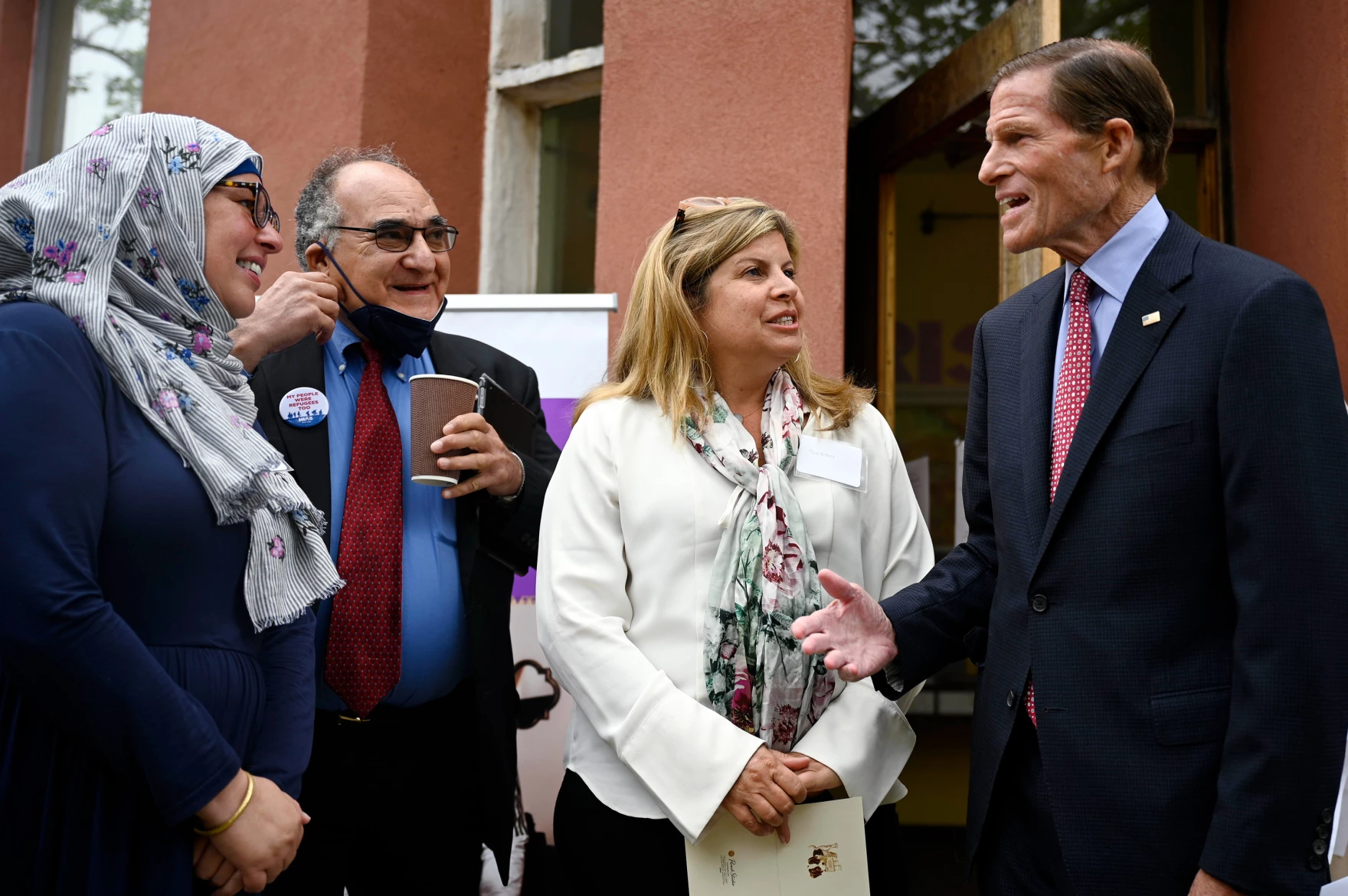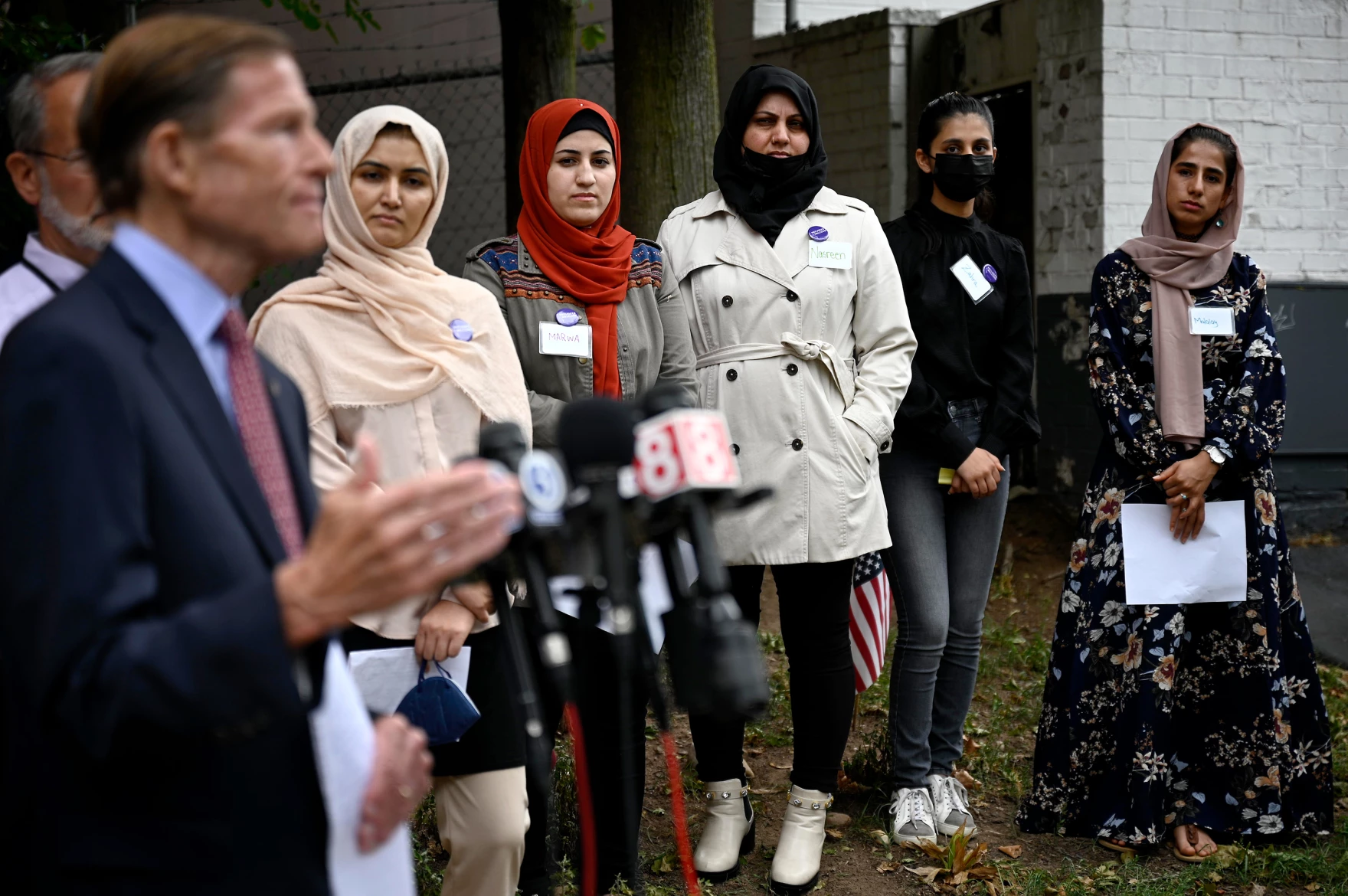New federal proposal could help thousands of Afghan refugees obtain green cards

Malalay, an Afghan refugee, speaks in front of Integrated Refugee & Immigrant Services (IRIS) in New Haven on Aug. 17, 2022. Malalay fears for her family still in Afghanistan and hopes to become a U.S. citizen through the new Afghan Adjustment Act so that she can help her family come to America. (Ryan Caron King / Connecticut Public)
A couple of hundred Afghan evacuees now call Connecticut home after many were forced to flee last year during the Taliban takeover of Afghanistan.
In just a couple of months, many secured jobs, housing and education. But one piece of the puzzle remains unclear for many: a permanent immigration status.
That could soon change. The Afghan Adjustment Act, new bipartisan federal legislation introduced last week, could give more than 80,000 Afghan evacuees in legal limbo in the U.S. a clear pathway to permanent residency.
“They have come here seeking asylum. They have humanitarian status, but the Afghan Adjustment Act will give them permanent legal status, a resident status that will at some point afford them also the opportunity for citizenship,” said Democrat U.S. Sen. Richard Blumenthal, a co-sponsor of the bill. He spoke in New Haven Wednesday morning to announce the bill alongside resettlement groups.

At Integrated Refugee & Immigrant Services (IRIS) in New Haven, U.S. Sen. Richard Blumenthal announces the federal Afghan Adjustment Act, which would allow Afghan allies with temporary legal status to apply for permanent legal status in the U.S. Standing, from left, are Martine Dherte, director of refugee services for the Connecticut Institute for Refugees and Immigrants (CIRI); Robert Fishman of the Connecticut Immigrant and Refugee Coalition; Susan Schnitzer, president of CIRI; and Blumenthal. (Ryan Caron King / Connecticut Public)
In an effort to get people out of Afghanistan last fall, the United States granted evacuees humanitarian parole status. The temporary visa allows evacuees to live and work in the U.S. for two years. But after the two-year period, options are limited for evacuees in the current system. For many, the only option is applying for asylum status – a process that involves once again proving why they deserve protection, not to mention a backlog of 1.4 million cases.
“Trying to get asylum for 80,000 people will take decades,” said Susan Schnitzer, the President of Connecticut Institute for Refugees and Immigrants (CIRI). “So there’s a practical nature to this that will help unclog an already overwhelmed immigration legal system.”
Schnitzer said legal status should be the last thing Afghan refugees should have to worry about especially as many continue to lose sleep over loved ones they left behind. If successful, the measure would not only expedite the process for legal status for those already in America, but it could open the door for family reunification. Once refugees have permanent legal status, they can later apply for full U.S. citizenship. American citizens can request that family members join them.
That is Malalay’s wish. Connecticut Public agreed to use only her first name because she fears for her family’s safety in Afghanistan.

Malalay, an Afghan refugee, wipes away a tear after speaking in front of IRIS in New Haven on Aug. 17, 2022. At right is Jessica DeVos, legal intern at IRIS. Malalay fears for her family still in Afghanistan. (Ryan Caron King / Connecticut Public)
“What you see in the media is only half of what is really happening, and it is getting worse as each day passes,” she said. “Many people tell me that I’m very lucky to be in America. Yes, I’m safe. But knowing that my family is not safe makes me sad. Every night I have bad dreams about Afghanistan. I don’t want to live without my family and my mom.”
The legislation also expands the Special Immigration Visa program to help more people evacuate Afghanistan. And it would be one of several instances in which the U.S. government has adjusted immigration statuses after humanitarian crises. Advocates said similar acts were passed when the U.S. withdrew from Vietnam and Fidel Castro rose to power in Cuba.
If successful, refugees with humanitarian parole status can apply for permanent legal status two years after their arrival. It could take a couple of months for them to then receive the physical green card.

U.S. Sen Richard Blumenthal speaks at Integrated Refugee & Immigrant Services (IRIS) in New Haven on Aug. 17, 2022. Women who have left Afghanistan joined him for the announcement of the Afghan Adjustment Act. (Ryan Caron King / Connecticut Public)
“There is vetting involved, compliance with the law and conditions attached. But anyone who basically plays by the rules, as almost every single one of these refugees and asylum seekers has done, will be eligible,” Blumenthal said.
Blumenthal along with advocates hope the measure is successful this session.
“It is really important that we provide them a chance,” said Martine Dherte, CIRI’s director of refugee services. “We are the ones who brought them here, we can’t send them back.”
